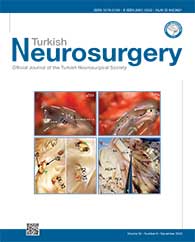2Istanbul Training and Research Hospital, University of Health Sciences Faculty of Medicine, Department of Neurosurgery, Istanbul, Turkey
3Diyarbakir Gazi Yasargil Training and Research Hospital, Department of Neurosurgery, Diyarbakir, Turkey
4Taksim Training and Research Hospital, Department of Neurosurgery, Istanbul, Turkey
5Demiroglu Bilim University, Department Histology and Embriology, Istanbul, Turkey DOI : 10.5137/1019-5149.JTN.37599-22.2 AIM: To investigate the neuroprotective effect of shilajit extract in experimental head trauma.
MATERIAL and METHODS: Three groups of 33 Sprague Dawley Albino strain male rats were included in the study. Group 1 (n=11): trauma but not treated. Group 2 (n=11): trauma and treated with 0.5 mL / rat saline Group 3 (n=11): 150 mg / kg shilajit extract was administered intraperitoneally in the treatment of trauma. Following the head trauma, the indicated treatments were applied to the 2nd and 3rd groups at the first, twenty-four and forty-eighth hours. Brain tissues and blood samples were taken after the control animals were sacrificed at the 72nd hour in all groups after trauma. Sections prepared from cerebral cortex and ca1 region were examined with hematoxylin eosin and luxol fast blue staining. Total antioxidant capacity, total oxidant capacity and oxidative stress index were measured from blood samples taken after routine procedures.
RESULTS: The number of red neurons and the severity of edema were significantly higher in both the cerebral cortex and the ca1 region in the group treated with trauma only and in the group administered saline after trauma compared to the group that received shilajit extract after trauma. The total antioxidant capacity increased significantly in blood samples taken only from the group treated with trauma and saline in post-trauma treatment compared to the group given post-traumatic shilajit extract, while shilajit extract given due to traumatic brain injury significantly decreased the total oxidant capacity and oxidative stress index values compared to the other groups.
CONCLUSION: Shilajit extract has been shown to have a neuroprotective effect in the treatment of acute traumatic brain injury. Our study showed that shilajit may be a useful option in the treatment of secondary brain injury, in humans.
Keywords : Experimental head trauma, Shilajit, Neuroprotection, Rats




